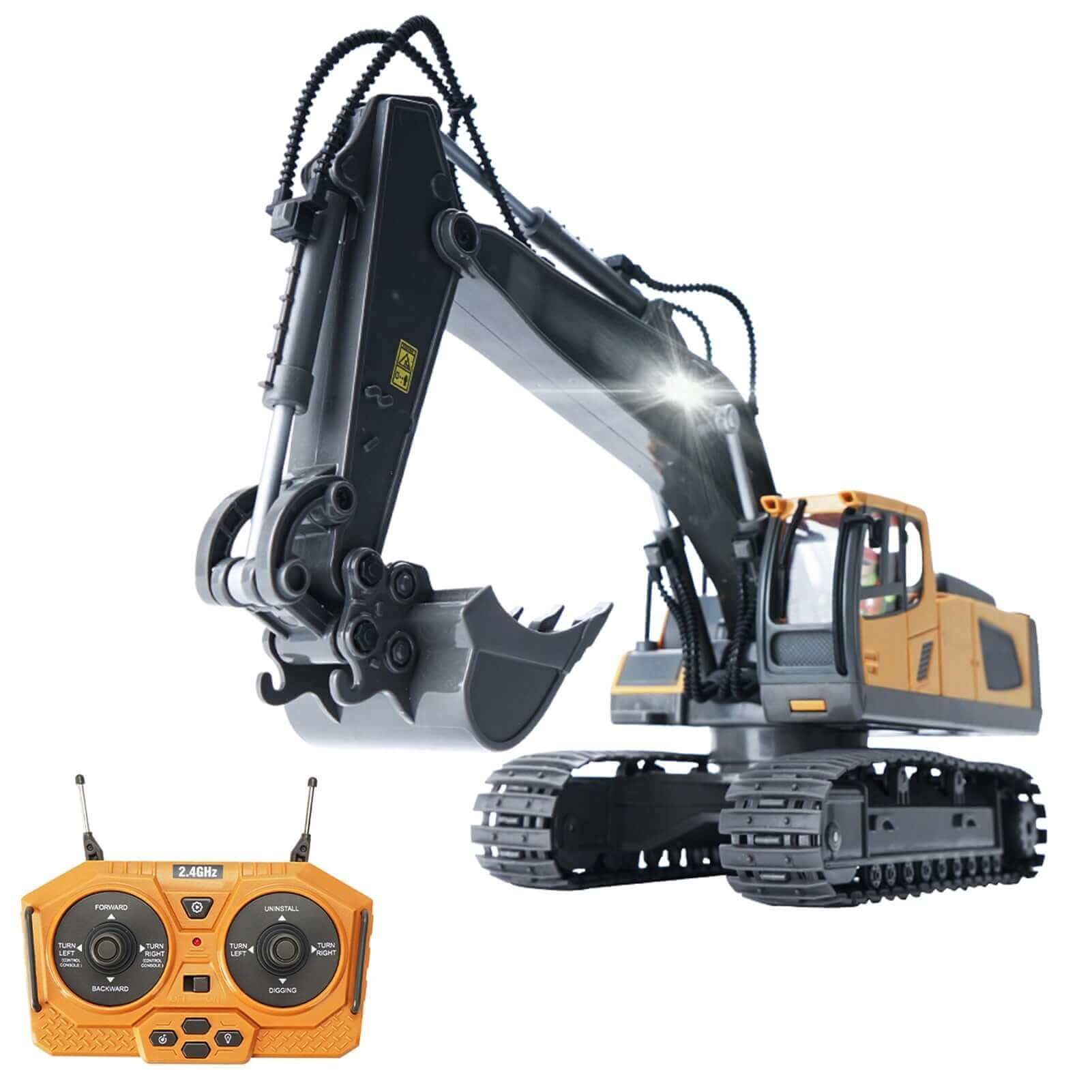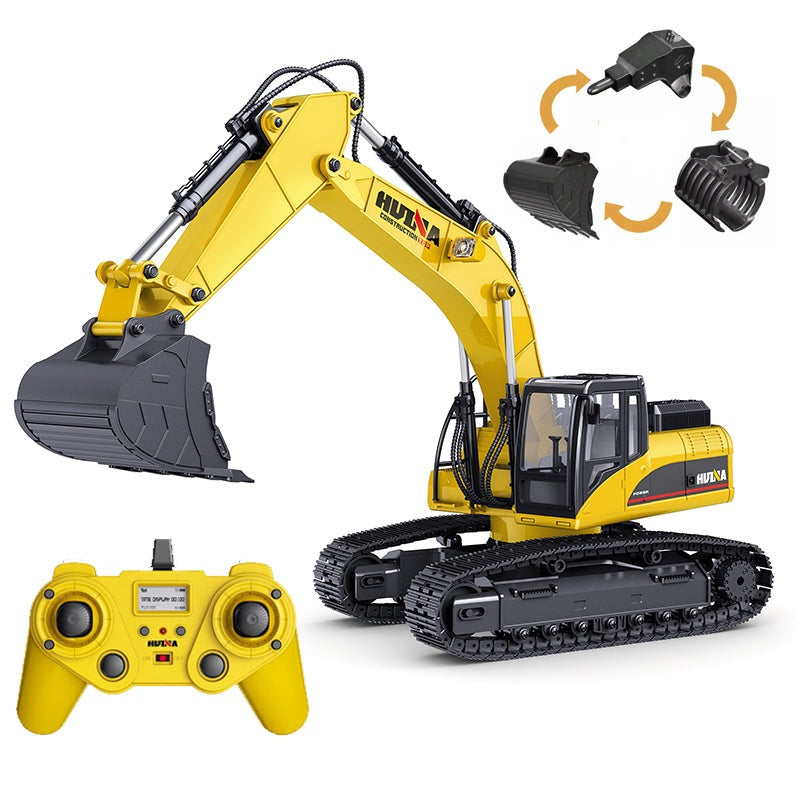Discover the Importance of Excavator in Modern Construction Projects
Excavators are essential tools in modern building projects. Their versatility allows them to carry out a large range of tasks, from excavating and grading to demolition and site preparation. Advanced functions, such as hydraulic attachments and general practitioners, enhance their capacities and effectiveness on work websites. As the market progresses, the value of excavators grows a lot more. Understanding their role can reveal understandings into the future of building methods. What lies ahead for these equipments?
The Flexibility of Excavators in Different Projects
Excavators are usually linked with large building and construction jobs, their adaptability enables them to be utilized in a wide array of applications, from property landscape design to energy upkeep. In metropolitan settings, excavators can navigate tight rooms to dig structures for homes or set up drain systems. Their ability to execute fragile tasks makes them ideal for landscape design tasks, where they can excavate for fish ponds or plant trees. In enhancement, excavators play a crucial function in utility maintenance, effectively digging trenches for pipes or cables without disrupting bordering areas. In agricultural applications, they help in land clearing and dirt prep work. Their adaptability enables them to be equipped with various accessories, enhancing their capability throughout various jobs. This diverse nature of excavators not only streamlines different building processes but additionally shows their important function in modern infrastructure growth and maintenance.
Secret Features and Sorts Of Excavators
The conversation on vital features and kinds of excavators highlights the essential features that make these devices important in building. Numerous excavator kinds, each made for particular tasks, show their adaptability and efficiency throughout various applications. rc excavator. Understanding these features and classifications is vital for maximizing their use in contemporary building jobs
Excavator Enters Summary
Excavators play an essential duty in modern construction, offering flexibility and efficiency across different tasks. These hefty machinery units come in numerous kinds, each customized for specific applications. The most typical types consist of crawler excavators, known for their stability on irregular surface, and rolled excavators, which give higher flexibility on smooth surface areas. Tiny excavators are favored for small jobs and limited rooms, while long-reach excavators are developed for deep excavating. Furthermore, there are customized excavators, such as hydraulic excavators, which boost power and accuracy. Each kind features unique capacities, making them crucial for jobs varying from digging and grading to demolition and product handling. Understanding these variants permits building and construction professionals to choose the right excavator for their project needs.
Trick Features Explained
Recognizing the vital functions of excavators enhances their reliable application in building projects. Excavators are defined by their powerful hydraulic systems, which offer the needed pressure for digging, lifting, and relocating materials. Their articulated arms enable a vast array of movement, assisting in exact operations in restricted areas. Furthermore, the variety of add-ons, such as pails, grapples, and augers, increases their adaptability to satisfy various project needs. The dimension and weight of excavators likewise add to their security and maneuverability on numerous terrains. In addition, improvements in technology have actually resulted in the integration of general practitioner and automation, improving precision and efficiency in excavation jobs. These functions jointly place excavators as crucial tools in modern-day building.
Applications in Building
Changing building websites, excavators play a critical function across various applications, ranging from residential building tasks to massive infrastructure developments. These functional makers are furnished for tasks such as digging structures, trenching for energies, and site grading. Various kinds of excavators, consisting of crawler, rolled, and mini excavators, offer certain benefits tailored to the project demands. Crawler excavators master harsh terrains, while wheeled excavators provide mobility on paved surfaces. Miniature excavators are optimal for confined rooms, making them preferred in city settings. The effectiveness and power of excavators significantly speed up building processes, making certain prompt job conclusion. Their versatility even more improves their significance, permitting construction groups to take on a varied variety of obstacles efficiently.
Enhancing Efficiency and Productivity on Work Sites
Optimizing performance and productivity on task sites is a critical goal in contemporary building and construction. Excavators play a critical role in attaining this objective by streamlining different jobs. Their capacity to carry out several functions-- such as training, digging, and grading-- decreases the requirement for extra equipment, therefore conserving time and resources.Moreover, excavators improve process by permitting for faster conclusion of jobs. With advanced features like hydraulic accessories and GPS modern technology, they can execute precise operations that decrease errors and remodel. This accuracy not just enhances the quality of job but additionally maximizes material usage, adding to set you back savings.The convenience of excavators allows them to adapt to various site conditions, making certain that jobs advance smoothly no matter obstacles. By integrating excavators right into construction processes, teams can greatly improve their total productivity, causing prompt task conclusion and raised success.
Safety Benefits of Utilizing Excavators
Excavators substantially improve safety on building and construction sites through enhanced operator presence and reduced manual work dangers. By giving operators with a clear view of their surroundings, excavators assist to avoid accidents and injuries. Furthermore, the machinery reduces the need for employees to engage in hazardous hand-operated jobs, additionally promoting a safer job setting.
Boosted Operator Visibility
Although building and construction websites can be chaotic and full of prospective threats, enhanced driver exposure plays an important role in guaranteeing security when using excavators. Modern excavators are designed with big, unhampered home windows and tactically placed mirrors, allowing operators to keep a clear view of their environments (rc excavator). This improved visibility is vital for identifying pedestrians, other machinery, and various obstacles, substantially lowering the danger of crashes. Additionally, many excavators incorporate sophisticated technology, such as sensors and cams, to give operators with extra point of views, additionally improving awareness. The ability to see more plainly not only aids in efficient operation but likewise cultivates a much safer workplace, making it less complicated for drivers to browse intricate building and construction websites without compromising safety and security standards
Minimized Manual Work Risks
When manual work is lowered through using excavators, many safety advantages emerge, significantly enhancing the wellness of building and construction employees. Excavators minimize the physical stress associated with hefty training and repetitive jobs, successfully decreasing the risk of musculoskeletal injuries. By automating procedures such as digging, grading, and moving products, they allow workers to preserve a more secure range from prospective hazards. Additionally, excavators are equipped with advanced safety and security attributes, such as rollover defense systems and boosted operator functional designs, which further secure employees on website. The result is a substantial reduction in work environment mishaps and injuries, bring about boosted productivity and morale among building and construction groups. Inevitably, the fostering of excavators adds to a safer and more effective building and construction atmosphere.
Excavators in Earthmoving and Website Prep Work
In modern building, a considerable part of earthmoving and site prep work jobs depends on the effectiveness and adaptability of excavators. These devices are designed to manage numerous soil types and terrain, making them essential for grading, website here excavating, and trenching tasks. Their hydraulic arms can be geared up with various attachments, such as augers and buckets, allowing operators to personalize their approach based upon details task requirements.Excavators succeed at moving big quantities of earth swiftly and successfully, which accelerates the overall building timeline. They can browse tight rooms and testing sites where typical tools might battle, enhancing productivity. In addition, the accuracy of excavators warranties that website prep look at here now work follows strict specifications, minimizing the threat of errors that might lead to pricey rework.
The Duty of Excavators in Demolition Tasks
Excavators play a vital function in demolition jobs, as they have the power and dexterity required to take down frameworks successfully. Geared up with numerous accessories such as hydraulic breakers, shears, and grapples, these machines can adjust to different demolition requirements, whether for little buildings or huge industrial sites. Their adaptability makes it possible for operators to tackle complex jobs while preserving safety and security and precision.In enhancement to their demolition capacities, excavators facilitate particles removal, ensuring that job websites remain secure and organized. By damaging down frameworks into workable pieces, they permit streamlined clearing and recycling of materials, aligning with modern sustainability efforts.Moreover, excavators can access tight rooms and navigate unequal terrain, making them important in urban demolition jobs. Overall, their durable layout and multifunctionality make excavators an essential possession in the demolition stage of building, adding substantially to job timelines and efficiency.


Future Trends in Excavator Technology and Use
As the construction sector advances, advancements in excavator modern technology are positioned to transform their usage and effectiveness significantly. One significant pattern is the integration of automation and expert system, enabling excavators to operate with minimal human treatment. This change will certainly improve precision in tasks such as grading and trenching, reducing human mistake and enhancing productivity.Additionally, the surge of hybrid and electrical excavators is forming a much more sustainable building atmosphere, reducing carbon exhausts and fuel prices. Improved telematics systems are also arising, making it possible for real-time surveillance of machine efficiency and upkeep requirements, which can lead to much better operational performance and longer equipment lifespan.Moreover, learn the facts here now improvements in attachment innovation are expanding the versatility of excavators, permitting them to execute a more comprehensive series of tasks. The mix of these fads demonstrates a future where excavators are smarter, greener, and a lot more adaptable, inevitably improving construction task characteristics.
Regularly Asked Questions
How Do Excavators Compare to Other Building Equipment?
Excavators, characterized by their versatility and power, master excavating and earthmoving compared to other equipment. Their capability to execute various tasks, including training and demolition, makes them crucial in building and construction tasks, improving overall performance.

What Is the Ordinary Life Expectancy of an Excavator?
The average life-span of an excavator normally ranges from 7,000 to 10,000 operating hours, relying on upkeep, usage problems, and version. Proper care can expand this lifespan, guaranteeing peak efficiency throughout its operational years.
How Are Excavators Maintained for Optimal Efficiency?
Excavators call for routine maintenance for peak performance, including regular examinations, liquid checks, filter replacements, and prompt repair services. Carrying out a preventive upkeep timetable aids prolong their lifespan and warranties effective operation in numerous construction atmospheres.
What Are the Costs Related To Getting an excavator vs. leasing?
The expenses connected with leasing versus buying an excavator differ significantly. Renting deals lower upfront expenses yet can build up in time, while purchasing requires a substantial initial investment, but supplies long-term cost savings and property ownership benefits.
What Training Is Required to Operate an Excavator?
Operating an excavator needs specialized training, typically including security protocols, equipment operation techniques, and environmental awareness. Qualification programs often mandate functional experience, making it possible for drivers to manage different jobs successfully while ensuring conformity with market regulations. The most usual kinds consist of crawler excavators, understood for their stability on unequal surface, and rolled excavators, which supply higher flexibility on smooth surfaces. Small excavators are favored for small jobs and tight areas, while long-reach excavators are made for deep digging. In addition, there are specific excavators, such as hydraulic excavators, which enhance power and precision. Different types of excavators, consisting of crawler, wheeled, and mini excavators, give particular benefits customized to the task demands. Spider excavators stand out in harsh surfaces, while wheeled excavators offer wheelchair on smooth surface areas.